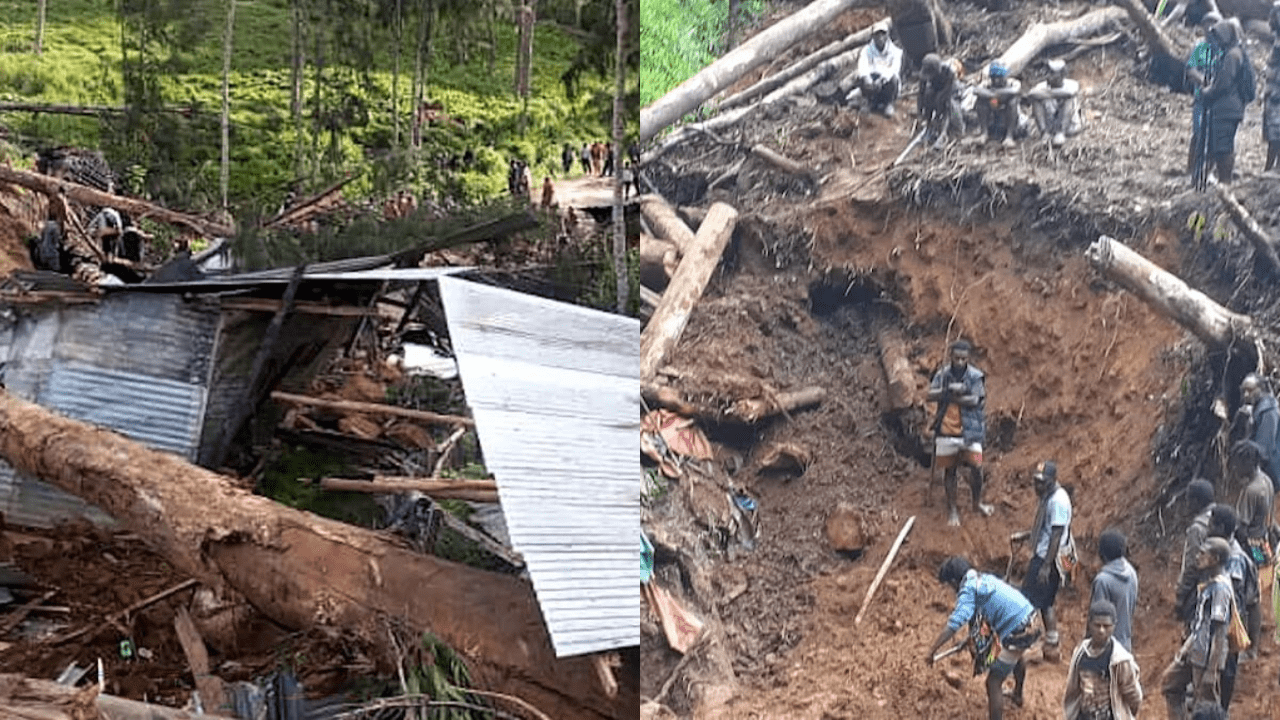The landslide in Papua New Guinea inflicted significant damage to buildings and agricultural areas, disrupting food gardens and severely impacting the country’s economic stability.

Papua New Guinea, a land of stunning landscapes and rugged terrain, has been struck by a devastating natural disaster. Recent landslides have wreaked havoc in the country, leaving over 2,000 people buried under debris and raising concerns about the safety and resilience of communities in the region.
The catastrophe unfolded in the early hours of the morning, catching many residents off guard as they slept. The landslides, triggered by heavy rainfall, cascaded down the steep slopes, engulfing homes and villages in their path. The scale of the disaster is staggering, with entire communities buried under tons of mud, rocks, and trees.
According to reports from local authorities, rescue efforts are underway, but progress is slow due to the challenging terrain and adverse weather conditions. Helicopters have been deployed to airlift survivors to safety, but the sheer magnitude of the disaster presents significant obstacles to relief operations.
The aftermath of the landslides is a scene of utter devastation. Homes have been reduced to rubble, roads blocked, and vital infrastructure damaged or destroyed. The affected areas are remote and isolated, further complicating rescue and recovery efforts.
The human toll of the disaster is immense. Families are grieving for loved ones who are missing or feared dead. Survivors are traumatized by the harrowing experience of being caught in the path of the landslides. The full extent of the casualties is yet to be determined, but it is clear that the impact on communities will be profound and long-lasting.

The landslides in Papua New Guinea are not an isolated incident but are symptomatic of larger environmental challenges facing the region. Deforestation, soil erosion, and climate change are exacerbating the risk of landslides, putting vulnerable communities at even greater peril.
In the wake of this disaster, there are urgent calls for action to address the underlying causes of landslides and to strengthen disaster preparedness and response capabilities. Governments, aid organizations, and the international community must work together to provide assistance to those affected and to support long-term recovery and resilience-building efforts.
The landslides in Papua New Guinea serve as a stark reminder of the fragility of human settlements in the face of natural disasters. As climate change continues to exacerbate extreme weather events, the risk of landslides and other hazards will only increase. It is imperative that we take decisive action to mitigate these risks and to protect the lives and livelihoods of vulnerable communities.
As the rescue and recovery efforts continue in Papua New Guinea, the world watches with bated breath, hoping for the safe return of survivors and mourning the lives lost in this tragic disaster. But beyond the immediate response, there is a pressing need for sustained commitment and investment in building more resilient communities that can withstand the growing threat of natural disasters. Only then can we hope to avert future tragedies and ensure a safer, more secure future for all.
Read Next:

The Psychology of Love: Why Valentines Day Matters More Epic Than You Think
Discover the psychology of love and why Valentines Day is more important than you think. Learn how love impacts the brain, strengthens relationships, and boosts

Premier League Highlights: Arsenal Humiliate Man City 5-1, Spurs and Palace Secure Crucial Wins
Arsenal demolished Manchester City 5-1 in a statement premier league highlights win, reigniting their title hopes. Meanwhile, Crystal Palace stunned Man United 2-0, and Tottenham

How Budget 2025 Impacts the Indian Middle-Class: Major Tax Benefits and Glaring Omissions
Budget 2025 offers major tax relief to the middle class, including zero tax on incomes up to ₹12 lakh. However, it misses out on incentives
